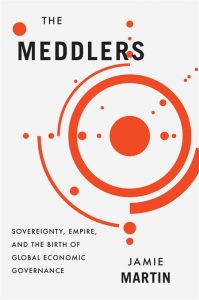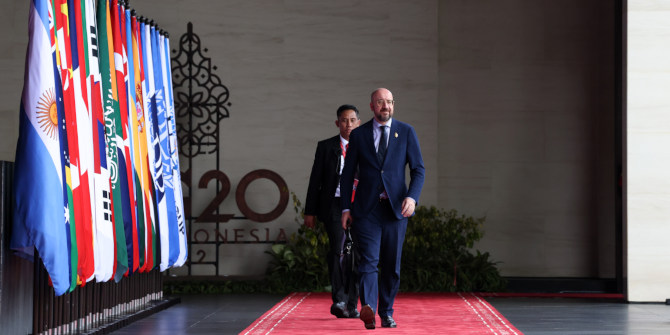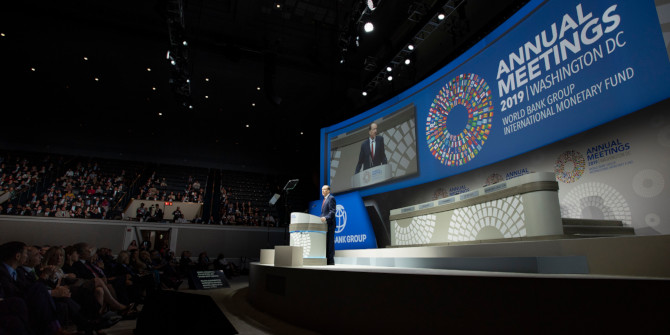In The Meddlers: Sovereignty, Empire and the Birth of Global Economic Governance, Jamie Martin offers a new history exploring the emergence of international economic institutions that continue to wield immense influence over the domestic politics of many states. The book comes at a perfect time to put the global economic system and the need for reform in its proper context, writes Kevin Gallagher.
The Meddlers: Sovereignty, Empire and the Birth of Global Economic Governance. Jamie Martin. Harvard University Press. 2022.
 Find this book (affiliate link):
Find this book (affiliate link):![]()
The way the history books tell it is that the 19th-century gold standard was an implicit form of global economic governance without governments. If a country was unable to make its gold payments, it was automatically forced to ‘adjust’ and deflate its economy into recession and repression. Prices would then be so low that other nations would purchase that country’s exports (in gold) and return the country to ‘equilibrium’. If that didn’t work, the prevailing empires at the time would form a debt commission and show up in your country to confiscate gold or equivalent assets.
In the aftermath of World War One, this sovereignty without standing under the gold standard proved incompatible with the rise of democracy and stable economic growth; such chaos accentuated the global depression. Charles Kindleberger shows that there was an attempt to create a new economic order at the infamous 1933 London Economic Conference. That failed miserably because of Britain’s inability to preside over the system and America’s resistance to assuming a leadership role as the new rising power.
The history books typically fast forward through a period of depression, war and economic chaos until 1944 to Bretton Woods, New Hampshire, at the United Nations Monetary and Financial Conference. At Bretton Woods, Franklin D. Roosevelt’s ‘New Dealers’ and England’s John Maynard Keynes worked alongside a handful of constructive developing countries to create a new system that had stable economic growth, full employment, democracy, prosperity and peace at its centre. Countries fixed their exchange rates to the US dollar, which was pegged gold — but they had the flexibility to adjust that peg alongside strict capital controls on speculative financial flows so countries could maintain stable growth and full employment. If things got really bad, the newly created International Monetary Fund (IMF) would provide emergency financing.
Most agree that this system worked fairly well, at least for the Western victors of World War Two, but the dollar-gold standard was abandoned by the US in the 1970s. Since then, the world economy has suffered innumerable economic crises, from the Latin American debt crises of the 1980s, the East Asian Financial Crisis and the Russian Crisis of the 1990s, the global financial crisis of 2008 and now the ‘polycrisis’ of this century. There is near unanimity that fundamental reforms are needed to this system. Jamie Martin’s The Meddlers comes at a perfect time to put this system and the need for reform in its proper context. The book fills a major gap in scholarship that will be essential to historians, legal scholars, economists and political scientists who study global economic governance. The Meddlers is also required reading for policymakers and advocates looking to fully understand a system in need of deep reform.
First, Martin documents that it is wrong to simply fast forward from World War One to 1944. The origins of the current global economic governance regime trace back to the economic arrangements put in place during the War by the Allied Powers, which were then grafted on to the League of Nations. Martin unearths fascinating stories about how the young Jean Monnet and Arthur Slater were tasked during the War to create a system of global economic governance among the Allies. This secured food, fuel and key ammunitions inputs, such as Chilean nitrates, to Allied powers. Martin shows how the Allied powers created a cartel-like arrangement so they could collectively demand low and secured prices from Chile, rather than engage in competition amongst each other and with Chile that could lead to rising prices for the West.
Martin shows that the World War One approach became a foundation for a pattern whereby powerful Western nations formed economic governance arrangements that provided financing for participating countries on condition that domestic markets and economic policy were opened up to at least partial control by foreigners who could ‘meddle’ in the domestic affairs of participating countries. In order to get ‘buy-in’ from the most powerful countries, there has been a double standard applied at these institutions, where the most powerful do not have to abide by those rules, but the vanquished and weak are to be meddled with.
Whether it is Chile and phosphates under the original wartime regime, Austria and Germany under the League of Nations or Germany under the Bank of International Settlements (BIS), Western powers used these institutions to expand market access and meddle in domestic economic affairs to the benefit of the West. Cornel Ban shows that certain ideas can travel as long as they are reframed, grafted and edited to suit the new environment. This framework can be applied to the actions of global economic governance institutions over time.
Martin agrees that Bretton Woods was an attempt to break from this tradition, but in many ways came to manifest it. The Bretton Woods system certainly made room for full employment policies and capital controls in the West. Yet, as early as the 1950s when Latin American countries received loans from the IMF, financing was given on the condition that they opened their economies and economic decision-making to Western capital. If another chapter were added that included this century, Martin’s arc would go full circle as Western countries now protect each other with central bank-swap networks. This allows industrialised countries to have stimulus-driven recoveries. Yet, as colleagues and I have recently demonstrated, poorer nations have to go to the IMF for austerity packages.
Interestingly, perhaps the one story that bucks the trend is that of nationalist China. China had been perhaps the most humiliated sovereign state under the British empire and other forms of foreign capital. Yet, Sun Yat-Sen, followed by nationalist Chiang Kai-Shek, sought foreign capital to develop the Chinese economy. Chinese nationalists insisted that Western finance not have the strings attached, eventually convincing Britain and other nations that China was too good not to invest in, but only on their terms — largely a function of social protest and hard bargaining. Unfortunately, war with Japan put this exception to an end.
Over the decades, especially in the 1960s and 1970s, some developing countries used many of these same techniques to create rival institutions, attempting to exercise what I have called countervailing monetary power in other contexts over these larger forces. Commodity agreements were negotiated at the UN that crafted cartels and coalitions across the developing world to get fair prices for the poor, rather than cheap prices for richer countries. With the exception of OPEC, these have long been dismantled. Perhaps now with the rise of China and other emerging powers creating institutions like the New Development Bank, country-swap networks and the recent Bridgetown Initiative, many of these same techniques are being grafted to developing country strategies to try and beat the industrialised countries at their own game. The Meddlers shows how such efforts must confront a long and powerful history.
Note: This review first appeared at our sister site, LSE Review of Books. It gives the views of the author, not the position of EUROPP – European Politics and Policy or the London School of Economics. Featured image credit: Hebi B. from Pixabay





